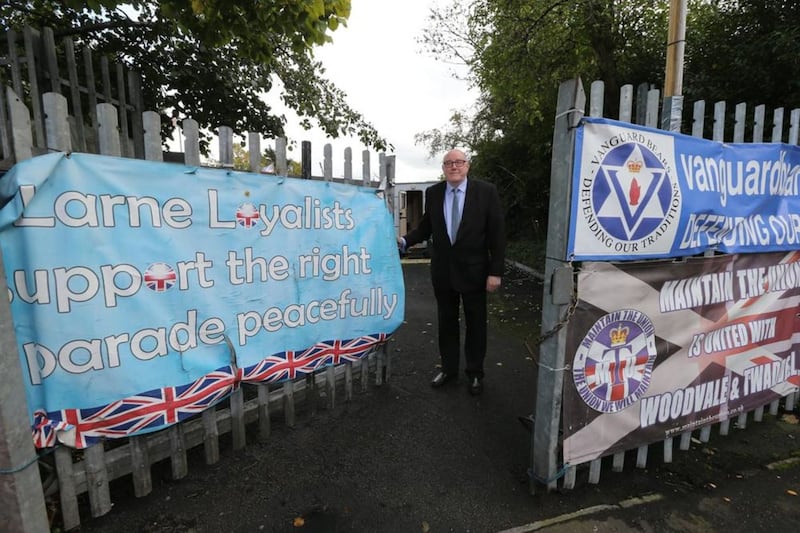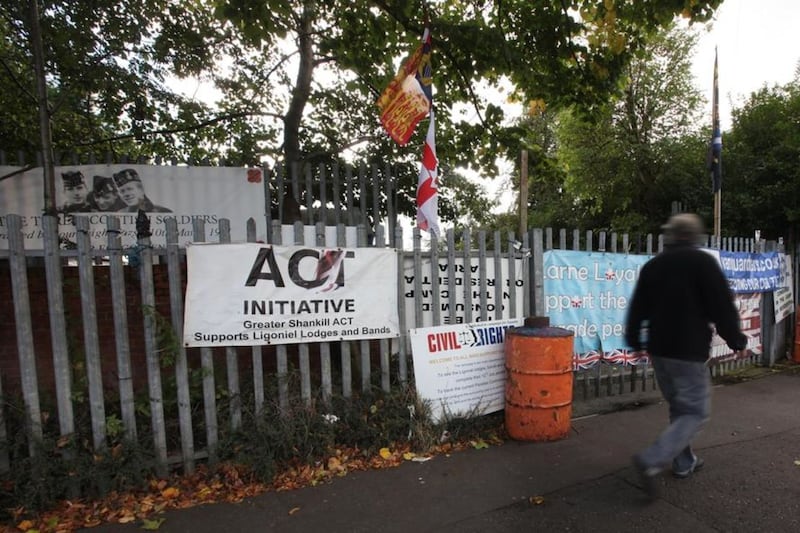A RESIDENTS' group which was not part of a deal to end the Ardoyne parading stand-off has said it has yet to decide whether it will protest against an 'agreed' Orange Order parade on Saturday morning.
The march along the Crumlin Road in north Belfast is set to complete a return parade banned in July 2013 and will see the dismantling of the loyalist protest camp at Twaddell Avenue on its conclusion.
As part of an agreement to end the impasse, reached between the Ligoniel lodges and Crumlin and Ardoyne Residents' Association (Cara) on Friday night, Cara has said it will not be protesting against this weekend's march.
However, Greater Ardoyne Residents Collective has criticised what it described as "a shady deal" and claimed that requests on "numerous occasions" for a meeting with Derry businessman Jim Roddy, who brokered the agreement along with Reverend Harold Good, had been refused.
It also said suggestions that there would be no future protests by residents - including Saturday's 8.30am parade - "cannot be guaranteed".
A Garc spokesman said on Sunday night: "As things stand there remains to be an application and there remains to be invited submissions from the community and until all that is finalised Garc continues to consult regarding our intentions for the weekend."
The dispute arose out of a Parades Commission ruling in 2013 to ban an Orange march on July 12 returning past the Ardoyne shops interface on the Crumlin Road.
Violence erupted afterwards and the Twaddell Avenue protest camp was formed, with loyalists vowing to maintain the protest until the lodges completed what they considered to be a traditional route.
It has cost around £20 million to police the protest.
The full text of the agreement states: "The procession (on Saturday) will be restricted to the three local lodges and their two bands and will proceed from the Woodvale Road to the dispersal point via the Crumlin Road without any undue stoppages.
"Only hymn music will be played, on the part of the route from the junction of Woodvale Road and Twaddell Avenue, up to the junction of Crumlin Road and Hesketh Road.
"On this section of the road, as noted above; all flags will be furled, except for the Union flag, Ulster flag and Orange standards, banners and bannerettes."
However, the deal reached between Cara and the lodges leaves the question of future evening parades open.
It states: "Following the completion of this parade (on Saturday) and in a spirit of reconciliation the Ligoniel Orange Lodges undertake to instigate a voluntary moratorium on applying for a return parade.
"This moratorium would allow for a process between the lodges and Cara to seek agreement on future return parades and if agreement is achieved the moratorium would be lifted."
The agreement notes that Cara will no longer object to morning parades, which have been allowed by the Parades Commission, provided certain conditions are adhered to by the Ligoniel lodges.
They have also said they will work to ensure no other lodges file for a return parade during the moratorium.
After Saturday morning the Twaddell protest camp will be dismantled and a "community forum" created to include representatives of Cara and the Orange Order.
The deal has been welcomed across the political spectrum, including the British and Irish governments, the north's main party leaders, the Orange Order, and Catholic and Protestant bishops.
First Minister Arlene Foster said it was "a significant step given this has been an initiative between the Orange and local residents", while Deputy First Minister Martin McGuinness said the "next phase of our political and peace processes must be the development of a real reconciliation process".
The Police Federation said: "This will immediately release the officers deployed in connection with that protest to be utilised in front-line duties in the communities they were extracted from."
However, SDLP assembly member Nichola Mallon said the deal "warrants an air of caution".
She said: "While this deal can be welcomed now, previous experience over many years warrants an air of caution. The success of this deal can only be judged in the long term."




